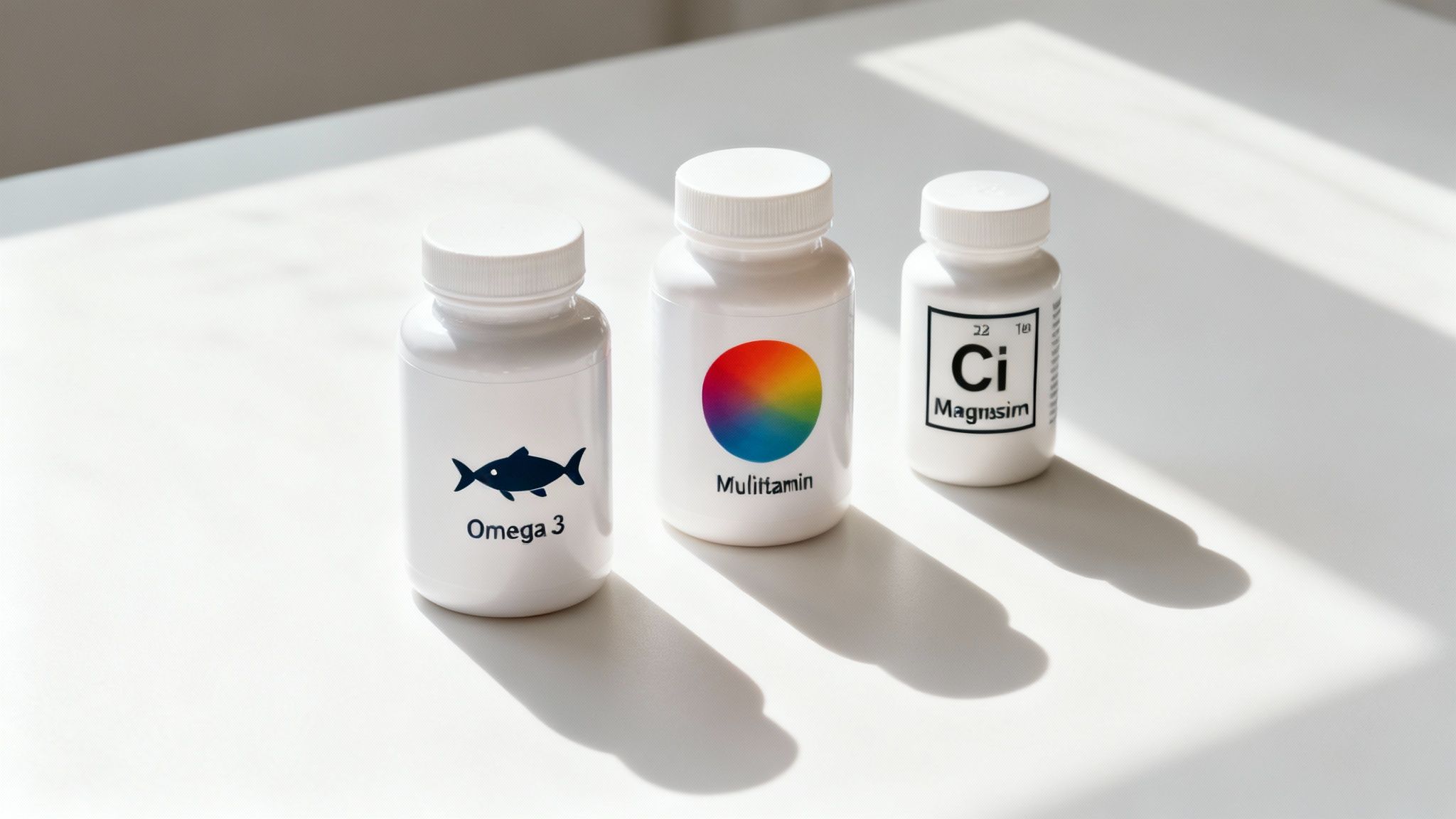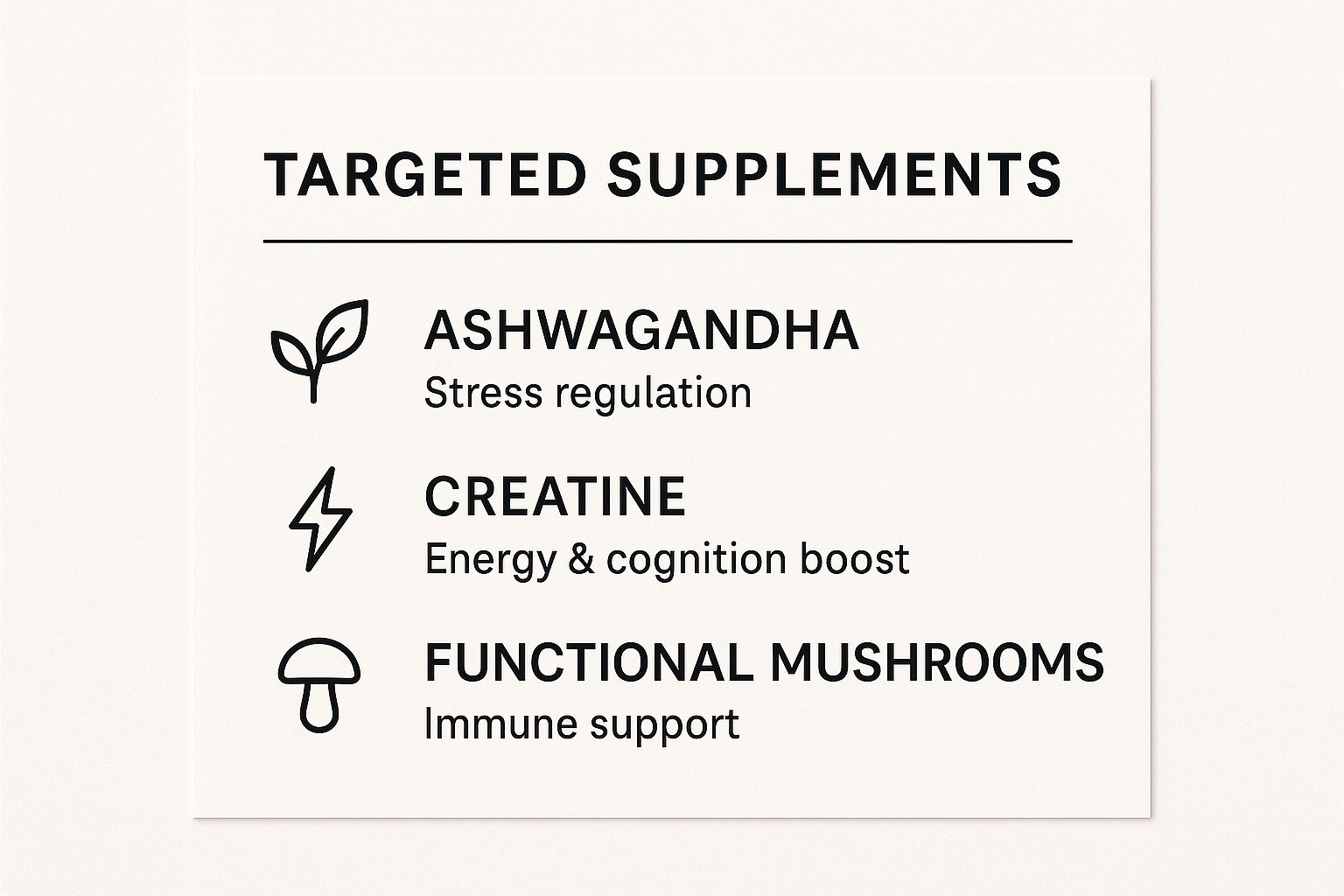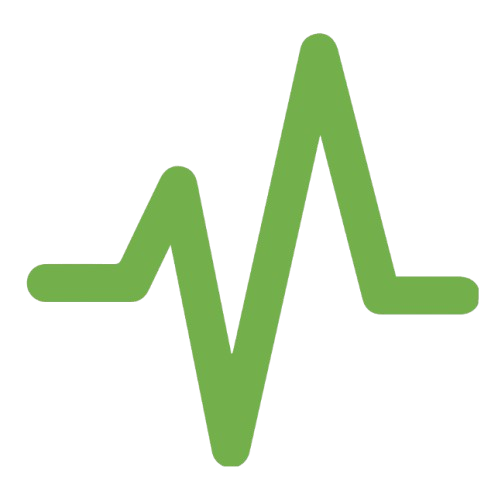
A Guide to Supplements for Women's Health
Share
The right supplements for a woman’s health aren't about chasing trends; they’re about targeting your unique needs, which are often tied to hormonal cycles, stress levels, and energy. Think of it as creating a foundational toolkit for long-term vitality. The essentials? A high-quality multivitamin to fill daily nutritional gaps, magnesium for relaxation and sleep, omega-3s to keep inflammation in check, and even creatine for a boost in energy and brainpower.
Why Women’s Nutritional Needs Are So Unique
A one-size-fits-all approach to nutrition just doesn’t cut it for women. A woman's body is in a constant state of flux, and our nutritional demands shift dramatically as we move through different life stages. You can almost think of your hormonal cycles like the changing seasons of a year; each phase calls for a different kind of preparation and support.
What your body needs during your reproductive years is worlds away from its requirements during pregnancy or menopause. These biological milestones place unique demands on your energy stores, bone density, and hormonal balance, often creating specific nutritional gaps that can be pretty tough to fill through diet alone.
This is where supplements for women's health can be a game-changer. They aren't a magic bullet, but rather a smart, targeted way to give your body the precise tools it needs to flourish during each of its "seasons."
Meeting the Demands of Every Life Stage
Throughout our lives, certain nutrients become absolutely critical. During menstruation, for instance, the risk of iron deficiency shoots up due to monthly blood loss. This can leave you feeling drained and fatigued, highlighting just how important certain minerals are. You can learn more about the crucial partnership between iron and B-12 in our detailed guide.
Pregnancy and the postpartum period create a massive demand for nutrients like folate, iron, and omega-3s to support both mum’s health and baby's development. Later, as we enter perimenopause and menopause, hormonal shifts can take a toll on bone health, making calcium and vitamin D non-negotiable for keeping our skeletons strong.
Supplements act as a reliable bridge, closing the gap between what your diet provides and what your body is demanding at any given time. They empower you to be proactive about your health, addressing needs before they become deficiencies.

It’s clear this awareness is growing. The UK dietary supplements market, where women's health is a huge driver, is set to skyrocket from USD 4.79 billion to USD 9.65 billion by 2033. Women in the UK are not only more likely to use supplements than men but are also fuelling demand in key areas like prenatal health.
By understanding these unique and evolving needs, you can use supplements to support key areas of your well-being:
- Sustained Energy: Fighting off the fatigue that’s so often linked to hormonal changes or nutrient gaps.
- Balanced Moods: Supporting your nervous system through periods of stress and hormonal fluctuation.
- Long-Term Vitality: Proactively protecting your bone, joint, and cognitive health for the future.
This strategic approach is all about setting the stage for a healthier, more resilient you.
Building Your Foundational Supplement Toolkit
Think of your daily health routine like building a house. Before you get to the fun stuff like picking out paint colours and furniture, you need to make sure the foundation is solid. In the world of supplements, that foundation is made up of a few core nutrients that support your body’s most critical functions, creating a stable base for your overall well-being.
Starting with these essentials means you're covering the most common nutritional gaps before you even think about more specific support. This isn't about jumping on the latest trend; it's about making smart, impactful choices that build resilience from the ground up. Let's walk through the three pillars of a foundational supplement toolkit.

Omega-3s: The Body's Essential Lubricant
You know that annoying creak a door hinge makes when it's dry? That’s a good way to think about what happens inside our bodies without enough omega-3s. These fatty acids, especially EPA and DHA, act like a lubricant for your entire system, from your brain to your joints. Their main job is to help manage inflammation—a natural process that can easily get out of hand thanks to stress, diet, or just modern life.
When inflammation sticks around for too long, it’s linked to a whole host of health issues. Keeping it in check is absolutely vital for long-term health. Omega-3s are key players in:
- Brain Health: DHA is a major building block of your brain and retinas, helping to support cognitive function, memory, and even mood.
- Heart Health: They play a part in maintaining healthy blood pressure and triglyceride levels.
- Joint Comfort: By helping to balance the body's inflammatory response, they can support mobility and ease stiffness in your joints.
Our bodies can't make these essential fats very well on their own, so we have to get them from our diet (think fatty fish like salmon) or through a good supplement. A typical recommendation is 1,000-2,000 mg of combined EPA and DHA daily, though this can vary.
Your Multivitamin: A Daily Nutritional Insurance Policy
Let's be honest, even with the best intentions, eating a perfectly balanced diet every single day is a tall order. A high-quality multivitamin is like a nutritional insurance policy; it fills in the small but significant gaps that inevitably happen. It’s your guarantee that your body has a steady supply of the essential vitamins and minerals it needs for thousands of microscopic tasks.
For women, certain nutrients in a multi are especially important. B vitamins are crucial for energy, iron helps transport oxygen (a big one for those of us who menstruate), and vitamin D is a non-negotiable for bone and immune health. As you build your toolkit, it's also helpful to understand how other supplements, like probiotics, can support nutrient absorption. You can learn more about options like Digestive Enzymes vs Probiotics to see what might fit your needs.
When you're picking a formula, quality really does matter. Look for bioavailable forms of nutrients—things like methylated B vitamins and chelated minerals—which are simply forms your body can absorb and use more easily. For a deeper dive, check out our guide on choosing a multivitamin for women.
Magnesium: The Master Mineral for Relaxation
If there was a 'master mineral' for the frantic pace of modern life, magnesium would be it. This incredible nutrient is involved in over 300 essential biochemical reactions in the body, from energy production to DNA repair. Yet, so many of us are falling short.
For women, magnesium is a real hero for managing stress, promoting deep, restful sleep, and easing muscle tension and cramps.
Think of magnesium as your body's 'off switch.' It helps calm the nervous system, allowing you to transition from a state of high alert to one of rest and recovery. This makes it a cornerstone of any supplement routine focused on stress and sleep.
But here’s the thing: not all magnesium is created equal. The form you choose really directs its benefits:
- Magnesium Glycinate: This one is highly absorbable and gentle on the stomach. It's my top pick for promoting relaxation, dialling down anxiety, and improving sleep quality.
- Magnesium Citrate: Known for its mild laxative effect, this form is often used to support digestive regularity while still delivering those calming magnesium benefits.
- Magnesium Threonate: This form has a unique ability to cross the blood-brain barrier, making it a fantastic choice for supporting cognitive function and brain health.
A great starting dose is usually between 200-400 mg per day. I often suggest taking it in the evening to wind down and support a good night's sleep. By starting with these three—Omega-3s, a multivitamin, and magnesium—you create a powerful and reliable base for your health journey.
Targeting Your Specific Health and Wellness Goals
Once you've got your nutritional foundations sorted, it's time to get a bit more personal with your routine. This is where you can bring in specific supplements to tackle your unique wellness goals, whether that’s building resilience to stress, putting a bit more pep in your step, or giving your immune system a helping hand.
Think of it this way: your multivitamin is the trusty all-purpose tool in your kit, while these targeted supplements are the specialised gear you bring out for a specific job. This more focused approach is really catching on in the UK, with women looking beyond one-size-fits-all solutions. We're seeing a big shift towards ingredients like maca root and chasteberry for everything from menstrual health and hormonal balance to navigating menopause.
Let's dive into some of the most effective supplements designed to meet these specific goals.
This little summary gives you a snapshot of some key players for different wellness objectives.

As you can see, you can match a supplement like ashwagandha to stress, creatine to energy, and mushroom blends to immunity. It's all about finding the right tool for the task at hand.
Ashwagandha: Your Personal Stress Thermostat
Modern life has a knack for leaving our stress response system stuck in the "on" position. The result? Sky-high levels of the stress hormone, cortisol, which can leave you feeling wired but tired and emotionally frayed. Enter ashwagandha, an ancient herb known as an adaptogen that works like a clever stress thermostat for your body.
Instead of just masking the symptoms, adaptogens help your body adapt and manage stress more effectively. When your cortisol is through the roof, ashwagandha can help dial it back down. When you’re feeling completely drained, it can offer a gentle, restorative lift.
Ashwagandha doesn’t make stress disappear, but it helps fine-tune your body's reaction to it. This allows you to handle life's challenges with more calm and resilience, sidestepping the burnout that often comes with chronic stress.
This powerful herb is a game-changer for women, especially since stress can throw your hormones completely out of whack. By supporting a healthier stress response, ashwagandha can lead to more stable moods and energy levels. If you're curious to learn more, check out our in-depth article on supplements that can help with hormone imbalance.
Creatine: Your Cellular Battery Charger
For years, creatine got a bad rap as a supplement just for bodybuilders trying to bulk up. Honestly, that couldn't be further from the truth. For women, it’s one of the most effective and well-researched supplements out there for boosting both physical and mental performance.
Think of it as a cellular battery charger for your entire body. Creatine helps your body produce adenosine triphosphate (ATP), which is the main energy currency your cells run on. More ATP means more juice for everything you do.
And the benefits go way beyond the gym:
- Sharper Brain Function: Your brain uses a huge amount of energy. Creatine has been shown to support memory, focus, and mental clarity, especially when you're tackling demanding tasks.
- Better Mood and Energy: By topping up your cellular energy, creatine can help fight off that mental fog that often drags your mood down with it.
- Increased Strength and Fitness: It gives you the power to push through workouts, whether that's lifting a little heavier or squeezing out one more rep. This is absolutely crucial for building and maintaining lean muscle.
For women, a simple daily dose of 3-5 grams is all it takes. There's no need for any complicated "loading" phases; just consistent daily use will get you the results.
Mushroom Blends and Energy Powders
Beyond single-ingredient heroes, some of the most exciting innovations are happening with smart blends that offer a combined approach to wellness.
Functional mushroom blends, featuring powerhouses like Lion's Mane, Reishi, and Cordyceps, are fantastic for supporting your immune system and cognitive health. Each mushroom brings its own unique set of benefits to the table, and together they create a powerful synergy to boost your overall vitality.
And for those days when you need a clean lift, energy powders are a brilliant alternative to sugary drinks or that fourth cup of coffee. Look for formulas that pair a moderate amount of caffeine with nootropics like L-theanine. This combo gives you a smooth, sustained boost in energy and focus without the jitters or the dreaded afternoon crash. Perfect.
How to Adapt Your Supplements for Every Life Stage
Your body’s needs change over time, so why should your supplement routine stay the same? It shouldn't. Think of it like changing your wardrobe for different seasons; adapting your supplements for each new stage of life is just smart. It ensures you’re giving your body the precise support it needs to feel its best, year after year.
This is your practical roadmap for tailoring your regimen as life unfolds.

Taking this strategic approach helps you stay one step ahead, addressing common challenges before they even start. It’s about more than just reacting to symptoms—it’s about anticipating what your body needs for its next chapter and making sure it has the right nutritional tools for the job.
Your Reproductive and Pre-Conception Years
In your 20s and 30s, the conversation often revolves around hormonal balance, managing period symptoms, and keeping your energy levels up. The monthly cycle puts unique demands on the body, especially when it comes to certain nutrients that can dip and spike.
This is the time to build a really solid nutritional foundation.
- Iron: Absolutely crucial for replacing what’s lost during menstruation and fighting off that all-too-common fatigue from iron deficiency. A little tip: pairing it with vitamin C can give its absorption a serious boost.
- Omega-3s: These healthy fats are fantastic for keeping inflammation in check, which can mean fewer menstrual cramps and a more stable mood.
- Magnesium: Often called nature’s relaxant for good reason. Magnesium is brilliant for easing premenstrual symptoms like cramps, bloating, and irritability.
Pregnancy and Postpartum Support
Pregnancy and the postpartum period are, without a doubt, the most nutritionally demanding times in a woman’s life. Your body is working overtime, first to build a whole new person and then to recover from the marathon of birth. This requires a major increase in specific vitamins and minerals to support both you and your baby.
During this stage, your standard multivitamin just won't cut it anymore. You need something specifically formulated for these heightened needs.
A high-quality prenatal vitamin is completely non-negotiable. It’s your comprehensive safety net, providing critical nutrients like folic acid for neural tube development, iron for your increased blood volume, and DHA (an omega-3) for the baby's brain and eye development.
And don't forget about postpartum recovery. Continuing with your prenatal for several months after giving birth, especially if you’re breastfeeding, helps replenish your depleted nutrient stores and supports your energy levels during a very demanding time.
Navigating Perimenopause and Menopause
As you enter perimenopause and move towards menopause, your hormonal landscape shifts dramatically. Declining oestrogen levels can bring a new set of challenges, from hot flushes and mood swings to a greater risk of bone density loss. Your supplement strategy needs to shift right along with it.
The focus now turns to protecting your long-term health and managing symptoms so you can maintain an excellent quality of life.
- Magnesium: This mineral becomes a real superhero during this phase. It can help with sleep disturbances, reduce anxiety, and support muscle function.
- Vitamin D & Calcium: This pair is the ultimate team for bone health. Without enough vitamin D, your body can only absorb about 10-15% of the calcium you get from food, making supplementation vital for preventing osteoporosis.
- Omega-3s: Sticking with omega-3s is important for managing inflammation, supporting your brain function, and keeping your heart healthy.
- Ashwagandha: This adaptogen can be a powerful ally for managing the mood swings and stress that often come with this transition.
As your body's needs and supplement strategies evolve through these stages, you might want to look further into how to support your long-term vitality. For a deeper dive, check out this a comprehensive guide to supplements for healthy aging.
To help you see this all at a glance, here’s a quick summary of which supplements to prioritise at each stage.
Supplement Recommendations by Life Stage
| Life Stage | Primary Health Focus | Recommended Supplements |
|---|---|---|
| Reproductive & Pre-Conception | Hormonal balance, menstrual health, energy | Iron, Omega-3s, Magnesium |
| Pregnancy & Postpartum | Foetal development, maternal recovery, nutrient replenishment | High-quality Prenatal (with Folic Acid, Iron, DHA) |
| Perimenopause & Menopause | Bone density, symptom management, heart health | Magnesium, Vitamin D & Calcium, Omega-3s, Ashwagandha |
By adjusting your supplements to match where you are in life, you’re providing targeted, effective support that can truly make a difference. This personalised approach is a cornerstone of any smart and sustainable wellness strategy.
Choosing High-Quality Supplements You Can Trust
Stepping into the world of supplements can feel a bit like navigating a maze. With countless brands shouting bold claims from the rooftops, how do you sort the genuinely brilliant products from the cleverly marketed duds? The key is to become a savvy shopper, and that all starts with knowing what to look for—and what to run a mile from.
Not all supplements are created equal, not by a long shot. Think of this section as your practical toolkit for making choices you can feel confident about, ensuring the products you invest in are safe, transparent, and actually do what they say on the tin.
Decoding the Supplement Label
That label on the bottle is your first line of defence. Learning to read it properly is a skill that empowers you to see past the flashy packaging and focus on what really counts.
First up, always check the serving size. A bottle might shout about a high dosage, but you could find that it's spread across three or four capsules. Next, take a close look at the active ingredients and their specific forms. This is where you can really spot the quality.
The form of a nutrient dictates its bioavailability—basically, how well your body can absorb and use it. A high dose of a poorly absorbed ingredient is far less effective than a smaller, more sensible dose of a highly bioavailable one.
For instance, keep an eye out for chelated minerals like magnesium glycinate or zinc picolinate. The chelation process cleverly binds the mineral to an amino acid, making it much easier for your body to recognise and absorb. As a bonus, these forms are often much gentler on your stomach.
The Importance of Third-Party Testing
The supplement industry isn't as tightly regulated as pharmaceuticals, which makes independent verification absolutely crucial. Third-party testing is your guarantee that what's on the label is actually what's in the bottle.
These independent organisations test products for purity, potency, and any nasty contaminants. Spotting their logo on a product is a strong signal that a brand is serious about quality and your safety.
- NSF Certified for Sport: This certification is the gold standard. It ensures products are free from over 270 substances banned by major athletic organisations.
- Informed-Sport: This global programme goes a step further, testing every single batch of a product for banned substances and impurities before it even hits the market.
Choosing supplements with these certifications gives you peace of mind that you're taking something that's both safe and accurately labelled.
Red Flags to Watch Out For
Just as important as knowing what to look for is knowing what to avoid. Certain phrases and practices are common red flags that should make you hit the pause button and question a product's integrity.
One of the biggest culprits is the ‘proprietary blend’. This is a sneaky trick where a company lists a mix of ingredients under a single trademarked name, without telling you the exact amount of each one. This lack of transparency makes it impossible to know if you're getting an effective dose or just a sprinkle of "fairy dust."
Also, be wary of claims that sound too good to be true. While supplements can support your health in powerful ways, they aren't magic pills. Any product promising instant, dramatic results is likely over-hyping its benefits. Always prioritise transparency and realistic expectations. By arming yourself with this knowledge, you can confidently pick high-quality supplements that you can genuinely trust to support your health.
Got Questions About Women's Supplements? We’ve Got Answers.
Diving into the world of supplements can feel a bit like learning a new language. How long until I feel a difference? Can’t I just get everything from my diet? Where on earth do I even begin? It’s completely normal to have questions, so let’s clear the air.
Think of this as our final chat, a chance to tackle those lingering queries so you can move forward feeling confident and in control of your health choices.
Can I Get All My Nutrients from My Diet Alone?
While a brilliant, whole-food diet is always the best foundation, modern life has a knack for creating nutritional gaps. Things like soil depletion, food processing, and even just high-stress lifestyles mean it’s genuinely tough to get optimal levels of every single nutrient from food alone.
Take Vitamin D, for instance. If you live in the UK, getting enough from sunlight and food is a real challenge for a good chunk of the year. Supplements are designed to be a targeted top-up, filling in those specific gaps to make sure your body has everything it needs to really thrive.
See supplements as a partner to your diet, not a replacement. A healthy diet provides the broad foundation, and supplements offer focused support exactly where you need it most.
How Long Until I See Benefits from a Supplement?
Patience is key here. And consistency? That’s your absolute best friend. The time it takes to notice a change really comes down to the supplement itself and your own unique body.
Some things work quickly. You might feel the calming effects of magnesium or a clean lift from an energy powder within just a few hours or days. They have a more immediate action on your system.
But for supplements working on a deeper, cellular level—like Omega-3s for brain health or ashwagandha for building stress resilience—it can take several weeks, or even a few months, of daily use. Your body needs time to build up its stores of these nutrients to a point where you can feel a real, lasting difference. It’s a long-term investment in your well-being.
Are There Any Supplements I Shouldn’t Take Together?
Yes, this is a brilliant question. Some supplements can actually compete for absorption in your gut, making them less effective if you take them at the same time.
- Competitive Absorption: High doses of calcium, for example, can get in the way of your body absorbing both iron and zinc. It’s often best to space these out at different times of the day.
- Helpful Pairings: On the flip side, some combinations are fantastic. Taking vitamin C with your iron supplement can give its absorption a massive boost.
Because these interactions can get a bit complex, it’s always a good idea to have a quick chat with a healthcare professional. They can look at everything you’re taking and give you personalised advice on the best timing and pairings to make sure you’re getting the most out of every capsule.
I’m New to Supplements. Where Should I Start?
If you’re just starting out and feeling a bit overwhelmed, the best strategy is to keep it simple. A high-quality multivitamin and magnesium are an excellent starting point for most women.
Think of the multivitamin as your daily nutritional safety net. It’s there to cover a wide range of potential little gaps in your diet, ensuring you have a steady supply of the essentials.
Magnesium is a true powerhouse, involved in over 300 essential functions in the body, from managing stress and improving sleep to relaxing tense muscles. Since many of us are looking for a bit of extra support in those exact areas, it’s a fantastic foundational supplement. Together, these two create a solid base you can build on later, adding more specific supplements as you get clearer on your wellness goals.
At VitzAi.com, we use AI-driven insights to help you build a personalised supplement routine that targets your unique needs. Discover your tailored supplement recommendations today.
This article is for informational purposes only and is not medical advice. Always consult a qualified health professional before starting any new supplement or major lifestyle change.
